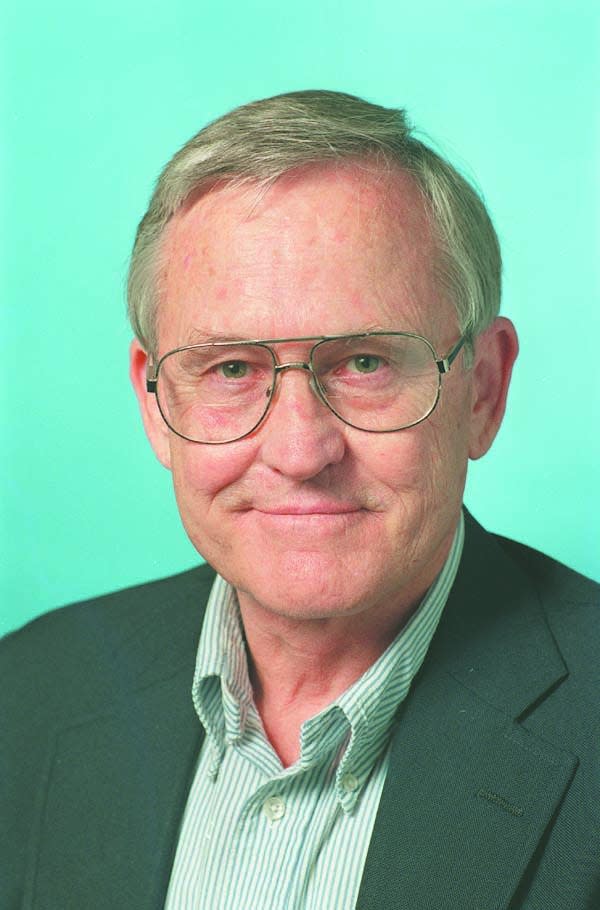Longtime 'Augusta Chronicle' editorial cartoonist Clyde Wells dies at 87
Clyde Wells – the longtime Augusta Chronicle editorial cartoonist who used his deft pen and keen wit to render unwavering opinions from caustic to caring – died Monday morning at his home in Martinez. He was 87.

A self-described “attack cartoonist,” Wells penned thousands of cartoons for The Chronicle from 1971 to his retirement in 1998 that caught the attention of readers not only locally but across the globe. Syndicated to more than 400 publications worldwide, his cartoons often appeared in The New York Times, The Washington Post and magazines such as Time, Newsweek and Playboy.
While most cartoonists perfect their craft through years of professional training, Wells had been working as a used-car dealer in Atlanta in the late 1960s when he began developing drawing skills he discovered as a child but didn’t pursue.
Wells submitted cartoons and more-detailed renderings of sports figures to newspapers and magazines, and in 1971 attracted the attention of The Chronicle’s editorial page editor, Louis Harris.
Persuading The Chronicle’s publisher, William S. Morris III, to hire Wells, Harris assigned the aspiring cartoonist to a special editorial-page project on a 90-day trial basis. The 90 days stretched to almost 27 years.
“Clyde was a splendid artist. He had a great sense of humor,” said Morris, now chairman of Morris Communications Co., which formerly owned The Chronicle. "Our readers enjoyed his cartoons and looked forward to seeing them. We will all miss him.”
Wells’ artistic observations on current events could deliver the impact of a sting, a jab or a quiet salute. One of his best-remembered cartoons, from 1986, showed the doomed space shuttle Challenger carrying its crew calmly into the waiting, outstretched hands of God.
That cartoon now hangs in the home of Phil Kent, who heads a public relations and marketing consulting firm in Atlanta. In 1974, Kent joined The Chronicle as an editorial writer and columnist.
“When I became The Chronicle's editorial page editor in 1982, Clyde had already built a statewide and national reputation through his work, which of course included hard-hitting cartoons on local, state and national issues,” Kent said. “And they often fit nicely with the editorials.”
Wells would say that his cartoons poking fun at public figures focused not on the people he drew but their questionable decisions. Many of his targets knew that. One of his recurring targets – Georgia Gov. and later President Jimmy Carter – wrote the foreword to Wells’ first of three book compilations of cartoons, The Net Effect, in 1979.
The book’s title is derived from one of Wells’ best-remembered local cartoons from 1975. When the Georgia Department of Transportation completed the first section of the new John C. Calhoun Expressway, the road ended abruptly in mid-air over 15th Street, amusing and alarming residents.
Wells’ famous cartoon on the unusual roadwork showed a giant net beneath the truncated road, presumably to catch cars that sped past the edge. The gag spurred the DOT to rush a delegation to Augusta to quell concerns.
Former Augusta Mayor Bob Young worked as a local broadcast journalist in when he ran into Wells one day in 1979, at the height of national worry over where massive debris would crash from the falling U.S. space station Skylab.
“I mentioned to Clyde, just in passing, 'Clyde, you know, Skylab could land in that net on the Calhoun Expressway,’ ” Young recalled Monday. “And darned if he didn’t draw a cartoon showing Skylab landing in the net on the Calhoun Expressway.
“He was really brilliant,” Young said. “He was able to take the absurdity in life and government and come up with something we could all look at and relate to.”
Former Columbia County News-Times Publisher Barry Paschal spent about eight years in The Chronicle’s editorial department editing Wells’ cartoons.
“I’ll never forget him walking into my office the first time and tossing a finished cartoon on my desk,” Paschal said. “I picked it up, read it, laughed and handed it back, saying ‘That’s good.’ He immediately handed it back to me and said, ‘I don’t care if you think it’s funny – just make sure everything is spelled correctly.’ ”
Wells’ cartoons “provided insightful views on a vital, transitional time in Augusta, thanks to his keen eye, rock-solid political moorings and biting wit,” Paschal said.
Award-winning editorial cartoonist Rick McKee started at The Chronicle in 1990 as the paper’s graphics editor.
“He knew I wanted to eventually succeed him whenever he decided to retire, and he was more than happy to share his experiences and wisdom,” said McKee, who did succeed Wells in 1998 and spent more than 20 years with the paper.
“Clyde was very principled. He was going to stand up for what he thought he was right and nobody was going to get him to budge or compromise to anything less than that.” McKee said. “It was a good lesson for an aspiring cartoonist and I’m glad I got to know him as a friend.”
Longtime Chronicle columnist Bill Kirby admired Wells’ “subtle, sly wit” in his drawings.
“In-person he often expressed surprise that people thought he was so good, and he always acted like he was the luckiest guy in the building to have landed the cartoonist job.” Kirby said. “He was kind, thoughtful and always encouraging to those of us whose mastery of our God-given gifts was not as great as his own.”
A graveside service will be held at 2 p.m. Wednesday at Hillcrest Memorial Park on Deans Bridge Road, with Augusta Judicial Circuit Chief Judge Daniel J. Craig officiating. There will be no formal visitation or reception.
This article originally appeared on Augusta Chronicle: Longtime 'Augusta Chronicle' cartoonist Clyde Wells dies at 87
